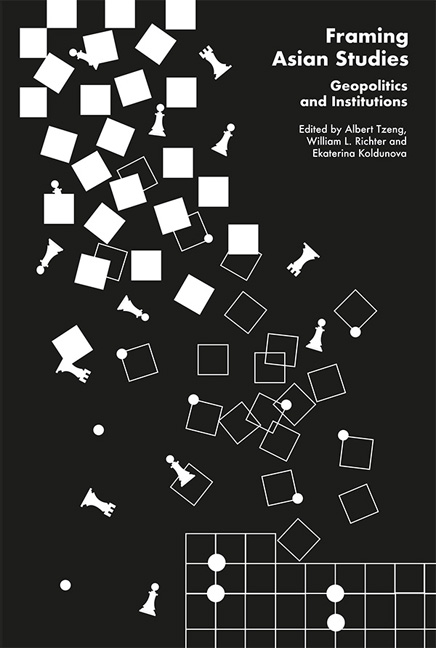Book contents
- Frontmatter
- Contents
- Foreword
- The Contributors
- 1 Introduction: Framing Asian Studies
- I Contested “Asia”
- II Geopolitical Framing of Western Discourse
- 5 From Geertz to Ricklefs: The Changing Discourse on Javanese Religion and its Wider Contexts
- 6 Framing Cambodian Affairs: French and American Scholarship, Media and Geopolitics
- 7 Studying Taiwan: The Politics of Area Studies in the United States and Europe
- III Asian Studies in Former Soviet States
- IV Inter-Asian Gazes
- Index
5 - From Geertz to Ricklefs: The Changing Discourse on Javanese Religion and its Wider Contexts
from II - Geopolitical Framing of Western Discourse
Published online by Cambridge University Press: 28 June 2018
- Frontmatter
- Contents
- Foreword
- The Contributors
- 1 Introduction: Framing Asian Studies
- I Contested “Asia”
- II Geopolitical Framing of Western Discourse
- 5 From Geertz to Ricklefs: The Changing Discourse on Javanese Religion and its Wider Contexts
- 6 Framing Cambodian Affairs: French and American Scholarship, Media and Geopolitics
- 7 Studying Taiwan: The Politics of Area Studies in the United States and Europe
- III Asian Studies in Former Soviet States
- IV Inter-Asian Gazes
- Index
Summary
It is particularly true that in describing the religion of such a complex civilization as the Javanese any simple unitary view is certain to be inadequate; and so I have tried in the following pages to show how much variation in ritual, contrast in belief, and conflict in values lie concealed behind the simple statement that Java is more than 90 per cent Moslem.
(Geertz 1960, p. 7)Much is about religion and politics, about the relationship between two forms of authority, knowledge and power and those who wield them.
(Ricklefs 2012, p. xviii)This essay, through reading of books written in English, analyses the changing discourse of the Javanese religion in the last half century. The analysis starts with Clifford Geertz's book The Religion of Java that was first published in 1960, seven years after he started his fieldwork in Java. It was only after the publication of The Religion of Java that a discussion on the notion of religion in Java among scholars was sustained. The last book in this analysis to comprehensively deal with the topic is Islamisation and Its Opponents in Java by Merle C. Ricklefs, published in 2012, seven decades after Geertz began his study. There is a clear discursive genealogy linking these two books, with Islamisation and Its Opponents in Java providing a convenient ending to the analysis. In between, several books were analysed, most notably Robert Hefner's Hindu Javanese: Tengger Tradition and Islam (1985), Andrew Beatty's The Variation of Javanese Religion: An Anthropological Account (1999), Denys Lombard's Nusa Jawa: Silang Budaya, especially volume two, published in Indonesia (1996), and Mark Hobart's Java, Indonesia and Islam (2011).
The above-mentioned books are viewed as landmarks of Western scholarly discourse concerning Javanese religion, spanning the eras from the Cold War to the War on Terror. Certainly there are many other books and journal articles — as shown in the list of references — that could be quoted to support the arguments in this chapter. The chapter is chronologically structured by locating Indonesia's political development in three periods: during the Cold War (1950–70), during and after the New Order (1970–2000), and during the War on Terror (2001–13).
- Type
- Chapter
- Information
- Framing Asian StudiesGeopolitics and Institutions, pp. 101 - 119Publisher: ISEAS–Yusof Ishak InstitutePrint publication year: 2018

